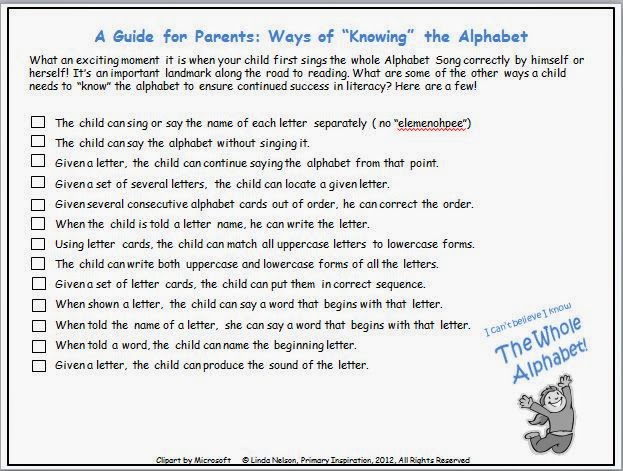Hi, Teaching Friends!
In a perfect world, all of your students would come to school knowing the alphabet.
Alas, as they say ... this is not a perfect world.
Some children thrive on the advantages of a print-rich home and the attention of concerned and capable families. Most of them sparkle when they come to school, and are ripe for learning more, more, more!!
But of course, that's not every child on your class list, and in some situations, it isn't even most of them. There are those children who were very happily learning in other ways, like playing in sandboxes and building with Legos, but just haven't been ready for alphabet and numbers yet. Sadly, there are also many bright children ...
and please believe me when I say that academic achievement is far from the only indicator of a bright child! ... who come to us from backgrounds of non-English speaking families, or lack of ability or interest on the part of families in teaching the early academics, or emotionally unstable homes, etc.
So, how can we help those families, both before their children begin school and now? Today I'd like to share just three little ideas for helping parents on the journey to literacy.
For the past few years, I've had the pleasure of addressing a group of parents of incoming kindergarteners at an evening program at our local library. With Pinterest being as pervasive as it is, many of these parents were very happy to be referred to a board where I continue to gather resources for them. It's filled with fun and do-able ideas, plus lots of links to lists, like "5 things you need to know about..." and "20 books about...", etc. Feel free to refer your students' families to this board, too.

Then there are those kiddos who come to school with the ability to sing the Alphabet Song (usually with a little "elemenohpee" thrown in, for good measure and cuteness), and families who think that's the whole ballgame. Here's a little freebie that's great for Parent Info Night, Meet the Teacher, Back to School Night, or whatever your school's name for it is! Encourage them to post this checklist and refer to it for new ideas about ways to "know" the alphabet. This list is also a handy item to fill out before a parent conference and use as a "talking point" during your discussion.

Another way to assist your families as they practice with their child at home is to equip them with an alphabet chart, as well as ideas for lots of ways to use it. Try alternate reading of letters (you, the child, you, the child,...) or letter/sound reading as in Wilson Phonics ("A, apple, /a/, B, ball, /b/, etc.). It's also fun to cut an alphabet chart apart to turn into a puzzle. Here's a free chart for you and your students! There are many others available on the internet. Use a variety of them and encourage families to do the same to help your students develop varied and flexible alphabet knowledge.
As a teacher, you may be looking for new ways to practice the alphabet in your centers and small groups. Here are a few from my store.
The Whole Alphabet: Naming, matching, sequencing, ... letters and sounds ... cards and games for centers and small groups.
Ready to Learn! : Alphabet cards, 10 mini-task cards, and a game.
This set of
alphabet riddles will get your little guys thinking hard about the names, shapes, sounds, and sequence of letters.
If you're looking for an inclusive set, try this
alphabet bundle.
I wish you all an exciting, challenging (in the best of ways!), and fulfilling school year as you embark on the learning adventure with your new students!
Happy Teaching!
























































